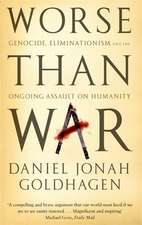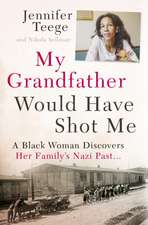The Roots of Evil: The Origins of Genocide and Other Group Violence
Autor Ervin Stauben Limba Engleză Paperback – 30 iul 1992
Preț: 441.28 lei
Nou
Puncte Express: 662
Preț estimativ în valută:
84.44€ • 88.34$ • 70.14£
84.44€ • 88.34$ • 70.14£
Carte tipărită la comandă
Livrare economică 02-16 aprilie
Preluare comenzi: 021 569.72.76
Specificații
ISBN-13: 9780521422147
ISBN-10: 0521422140
Pagini: 354
Ilustrații: 3 tables
Dimensiuni: 156 x 234 x 19 mm
Greutate: 0.52 kg
Ediția:Revised
Editura: Cambridge University Press
Colecția Cambridge University Press
Locul publicării:New York, United States
ISBN-10: 0521422140
Pagini: 354
Ilustrații: 3 tables
Dimensiuni: 156 x 234 x 19 mm
Greutate: 0.52 kg
Ediția:Revised
Editura: Cambridge University Press
Colecția Cambridge University Press
Locul publicării:New York, United States
Cuprins
Preface; Acknowledgments; Part I. Psychological and Cultural Bases of Genocide and Other Forms of Group Violence: 1. An introduction; 2. The origins of genocide and mass killing: core concepts; 3. The psychology of hard times: the effects of difficult life conditions; 4. Cultural and individual characteristics; 5. The psychology of perpetrators: individuals and groups; 6. Steps along a continuum of destruction: perpetrators and bystanders; Part II. The Nazi Holocaust: 7. Hitler comes to power; 8. Preconditions for the Holocaust in German culture; 9. Nazi rule and steps along the continuum of destruction; 10. The SS and the psychology of perpetrators; 11. The behaviour and psychology of bystanders and victims; Part III. Other Genocides and Mass Killings: 12. The Turkish genocide of the Armenians; 13. Cambodia: genocide to create a better world; 14. This disappearances: mass killing in Argentina; 15. Summary and conclusions: the societal and psychological origins of genocide and other atrocities; Part IV. Further Extensions: The Roots of War and the Creation of Caring and Nonaggressive Persons and Societies: 16. The cultural and psychological origins of war; 17. The nature of groups: security, power, justice, and positive connection; 18. The creation and evolution of caring, connection, and nonaggression; Notes; Index.
Recenzii
"A valuable and important study." Dimensions
"Thoughtful, provocative work." Indochina Chronology
"...a serious, noteworthy effort to present a general psychosocial/cultural analysis of the causes of genocide and mass destruction in the modern age." Bridges
"Staub offers us a multi-textured psychological understanding of genocide and group violence generally, as well as some concrete proposals for promoting caring, connection, and nonaggression. The book is well written and well organized; largely devoid of psychological jargon, yet conceptually rich, it should be easily comprehended by all. While it is written from the analytical perspective of a scholar, it is illuminated by the humane spirit of a man who, as a Hungarian Jew, experienced the horrors of the Holocaust. It is a provocative book from which scholars, students and the general public can benefit greatly." Pearl Oliner, Shofar
"...a rich essay based on extensive and thoughtful scholarship....Staub's book...represent[s] major advances in understanding our vulnerability to become perpetrators and the responsibilities and opportunities that inhere in our unchosen roles as bystanders." Contemporary Psychology
"...a valiant effort to confront the horrors of genocide while trying to articulate something redemptive about human beings, which may guide future practice....a poetic vision." Jeffrey A. Atlas, New Ideas in Psychology
"...a clear, plausible study of the origins of genocide and other group violence." KLIATT
"...methodical and well done...a well-written, scholarly-researched book." George B. Palermo, International Journal of Offender Therapy and Comparative Criminology
"Thoughtful, provocative work." Indochina Chronology
"...a serious, noteworthy effort to present a general psychosocial/cultural analysis of the causes of genocide and mass destruction in the modern age." Bridges
"Staub offers us a multi-textured psychological understanding of genocide and group violence generally, as well as some concrete proposals for promoting caring, connection, and nonaggression. The book is well written and well organized; largely devoid of psychological jargon, yet conceptually rich, it should be easily comprehended by all. While it is written from the analytical perspective of a scholar, it is illuminated by the humane spirit of a man who, as a Hungarian Jew, experienced the horrors of the Holocaust. It is a provocative book from which scholars, students and the general public can benefit greatly." Pearl Oliner, Shofar
"...a rich essay based on extensive and thoughtful scholarship....Staub's book...represent[s] major advances in understanding our vulnerability to become perpetrators and the responsibilities and opportunities that inhere in our unchosen roles as bystanders." Contemporary Psychology
"...a valiant effort to confront the horrors of genocide while trying to articulate something redemptive about human beings, which may guide future practice....a poetic vision." Jeffrey A. Atlas, New Ideas in Psychology
"...a clear, plausible study of the origins of genocide and other group violence." KLIATT
"...methodical and well done...a well-written, scholarly-researched book." George B. Palermo, International Journal of Offender Therapy and Comparative Criminology
Descriere
Erwin Staub explores the psychology of group aggression, sketching a conceptual framework for the many influences on one group's desire to harm another.














